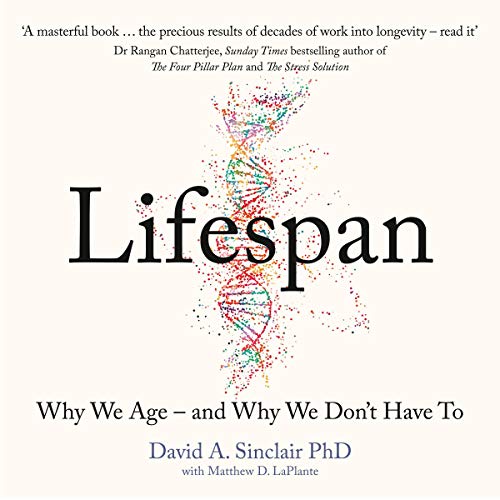Lifespan - David Sinclair

This book is about how to extend lifespan, and fight aging. It’s written by David Sinclair, the co-director of the center for Biology of Aging Research at Harvard Medical School.
Longevity is not only about living longer, it’s also about being younger longer. Ex: a man who is 40 has a lot more vitality than a man with the same age 5 centuries ago.
The Information Theory of Aging
hormesis is the mechanism that occurs at the cell level in reaction to stress, basically the cell enters in survival mode and tries to survive a little longer. That’s the start of longevity.
The more cells lose genetic information, the more the body age. To achieve better longevity, the goal is to find ways to keep this initial genetic information, this “Youth program”.
Youth => broken DNA => Genome instability => disruption of DNA => packaging and gene regulation (epigenome) => loss of cell identity => cellular senescence => disease => death.
Aging is a disease, and that disease is treatable.
Sinclair conveys the idea that aging is a disease, and that Alzheimer or heart disease are symptoms of it.
Ongoing experiments
NAD boosters are an effective treatment that creates the right level of stress to push the longevity genes into action to suppress epigenetic changes to maintain the “youthful program”. Experiments on mice were successful and improved their lifespan even when given in late life. Human studies are ongoing.
Health wearables
There are a lot of great devices that help us understand better our bodies and treat them accordingly. Sinclair expects those technologies to become more and more precise and cheaper in the next decades. Though he raises the point of health data privacy, and this will be a major issue.
Things we can do in our everyday lives
The goal is to put our body in stress mode, without making any damages. Here is a list of quick wins for that. Implemented in daily routines, they have a lot of positive effects on longevity and vitality.
- Do intermittent fasting, for example do not eat in the morning to have a 16h fasting easily
- Do cardio, ideally during fasting
- Try to confront cold and hot temperatures (sauna, go outside during cold winters, cold showers…)
- Don’t smoke / drink
- Eat a lot of plants and avoid red meat
He also takes Vitamin D, Vitamin K2 and 1g of NMN every morning.